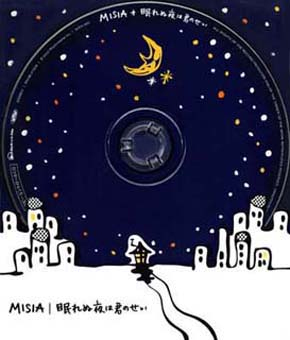
The Glove was a 1983 English musical collaboration and recording project by the Cure's Robert Smith and Siouxsie and the Banshees' Steven Severin. They released one studio album, Blue Sunshine, in 1983 as part of Severin's solo deal with Polydor. The latter came up with the band name, the album title and the blue/yellow sleeve concept, as Smith had to leave the project before completion due to prior commitments with the Cure.

Misaki Itō commonly known as Misia and stylized in all caps, is a Japanese singer and songwriter. Born in Tsushima, Nagasaki, Misia moved to Fukuoka at the age of 14 to pursue a recording career. There, she continued her secondary education and briefly attended Seinan Gakuin University before withdrawing to focus on her musical career. She was signed to BMG Japan in 1997, after auditioning for record producer Haruo Yoda.

The discography of Japanese R&B singer Misia consists of nine studio albums, three compilation albums, one extended play (EP), one live album, six remix albums, twenty-six singles, twelve promotional singles, eighteen video albums and thirty-seven music videos. In 1997, Misia signed a recording contract with BMG Japan and joined the then up-and-coming talent agency, Rhythmedia. Under the sub-label Arista Japan, Misia released her first single, "Tsutsumikomu Yō ni..." in February 1998, followed by "Hi no Ataru Basho" in May. In June, her debut album, Mother Father Brother Sister, opened at number three on the Oricon chart. The album peaked at number one three weeks later and stayed in the top five for eleven consecutive weeks. Mother Father Brother Sister was certified double million and won a Japan Record Award for Best Album, as well as a Japan Gold Disc Award for Pop Album of the Year. In 2000, Misia's second studio album, Love Is the Message, debuted at number one and was certified double million. It won a Japan Record Award for Best Album and a Japan Gold Disc Award for Pop Album of the Year. The album spawned three top ten hits: "Believe," "Wasurenai Hibi" and "Sweetness." Misia's first remix album, Misia Remix 2000 Little Tokyo, was released three months later and shot to number one. It sold over 800,000 copies and is the second best-selling remix album of all time in Japan.

"Believe" is Misia's 3rd single. It was released on April 21, 1999. It peaked at #2 selling 95,930 copies on its first week. The song was used in Hitachi's "Maxell MD" commercial. "Believe" is one of MISIA's signature songs.

"Sweetness" is Misia's 5th single. It was released on November 25, 1999 simultaneously with Wasurenai Hibi. It peaked at #7 selling 92,290 copies on its first week and went on to sell over 200,000 copies

"Escape" is Misia's 6th single. It was released on 7 July 2000. It peaked at #7 selling 81,130 copies on its first week. It was used in a commercial for Kenwood's "Avino".

"Hatenaku Tsuzuku Story" is Misia's 9th single overall and first with Rhythmedia Tribe. It was released on January 30, 2002. It peaked at #3 selling 86,780 copies on its first week. The song served as opening theme to NHK's Salt Lake City Olympics TV report. Jane Zhang's recorded the Chinese version of this song (我的路) in her third album, Jane@Music. Sarah Geronimo has an English version of the song entitled "Love Can't Lie," on her album Sweet Sixteen.

"Nemurenu Yoru wa Kimi no Sei" is Misia's 10th single. It was released on August 8, 2002. It reached #1, selling 128,630 copies in its first week. It was used as theme song for the drama "Ren'ai Hensachi" as well as in a commercial for Kirin's "Rakuda" beverage.

"Back Blocks" is Misia's 11th single. It was released on 20 November 2002. It peaked at #7 selling 30,846 copies in its first week. The third track, Tobikata wo Wasureta Chiisana Tori, serves as theme song for the PlayStation 2 game "Star Ocean: Till the End of Time".

"Kokoro Hitotsu" is Misia's 12th single. It was released on August 27, 2003. It peaked at #7 selling 36,771 copies in its first week. The song served as theme song for the movie Dragon Head, starring Satoshi Tsumabuki and Sayaka.

"Namae no Nai Sora o Miagete" is the fourteenth single by Japanese recording artist Misia. It was released on July 7, 2004 as the first and sole single from Misia's sixth studio album Singer for Singer.

Misia Remix 2003 Kiss in the Sky: Non Stop Mix is Misia's fourth remix album, released on April 23, 2003. It sold 31,648 copies in its first week and peaked at #3. Disc one is mixed by DJ Ta-shi whilst the second disc is mixed by DJ Gomi.

Ascension is the seventh studio album by Japanese R&B singer Misia, released on February 7, 2007. It is her first album in over two years and last to be released under the Avex subsidiary Rhythmedia Tribe. The album was later re-released under BMG Japan.

Soul Quest is the tenth studio album by Japanese singer Misia. It was released on July 27, 2011, through Ariola Japan. The album yielded three official singles, the digital exclusives "Edge of This World" and "Life in Harmony", and the sole physical release "Kioku". The lead track, "This Is Me", served as promotional single for the album.
"This Is Me" is a song recorded by Japanese singer Misia for her tenth studio album Soul Quest. It was released digitally as a promotional single by Ariola Japan on July 13, 2011.

"Deepness" is a song recorded by Japanese singer Misia. It was co-written by Misia and Jun Sasaki and produced by Misia. "Deepness" was released as a single by Ariola Japan on November 7, 2012. It is the theme song to the TBS drama series Ōoku: Tanjō - Arikoto / Iemitsu-hen, starring Masato Sakai and Mikako Tabe.

Super Best Records: 15th Celebration is the second greatest hits album by Japanese singer Misia. It was released to commemorate Misia's 15th anniversary as a recording artist by Ariola Japan on February 20, 2013, one day shy of her actual 15th anniversary. The three-disc set was released in Blu-spec CD2 format and each disc was remastered by a different music engineer. The compilation includes four reworked tracks, the singles "Koi wa Owaranai Zutto", "Deepness" and "Back in Love Again", and the new song "Holiday", which was released as a promotional single for the album.

New Morning is the eleventh studio album by Japanese singer Misia. The album was released by Ariola Japan on April 2, 2014, the same day as the 77th and final date of Misia's nationwide Hoshizora no Live VII: 15th Celebration concert tour, at the Bunkamura Orchard Hall, which was broadcast live on YouTube. The album yielded the singles "Shiawase o Forever" and "Boku wa Pegasus Kimi wa Polaris". The lead track "Hope & Dreams" was released as a promotional single for the album.

"Nagareboshi" is a song recorded by Japanese singer Misia. It was released by Ariola Japan as the third single from her twelfth studio album, Love Bebop (2016) on 8 July 2015, one day after Misia's 37th birthday. The song was written by Japanese singer-songwriter Rica and arranged and produced by Takayuki Hattori. "Nagareboshi" is the theme song to the 2015 film S The Last Policeman - Recovery of Our Future, a continuing film adaptation based on the television series of the same name, for which Misia's "Boku wa Pegasus Kimi wa Polaris" served as theme song. The digital single artwork was painted by author, screenwriter, director and painter Ellie Omiya.
"Anata ni Smile :)" (あなたにスマイル:), Anata ni Sumairu :), lit. "Smile at You :)") is a song recorded by Japanese singer Misia. It was released by Ariola Japan as the fourth single from her twelfth studio album, Love Bebop (2016) on 8 July 2015, one day after Misia's 37th birthday. The song was co-written by Misia and Ki-Yo, composed by the latter and produced by Hiroshi Matsui. "Anata ni Smile :)" was used in television ads for Kirin's Sekai no Kitchen Kara tea, for which a special version with alternate lyrics was recorded. The digital single artwork was painted by author, screenwriter, director and painter Ellie Omiya.


















